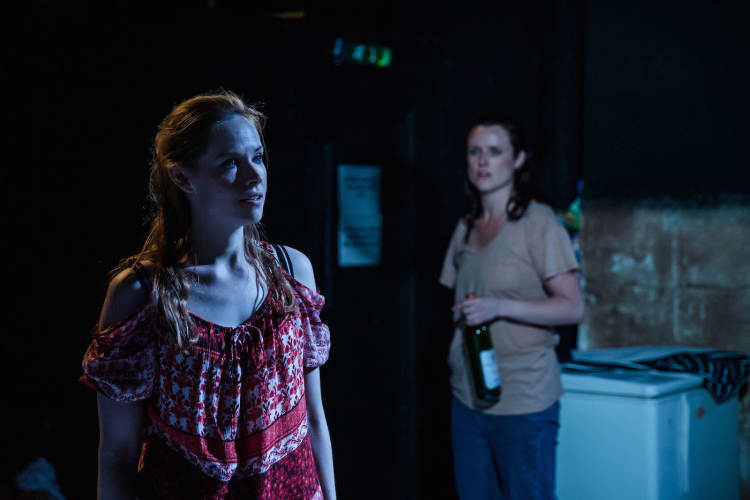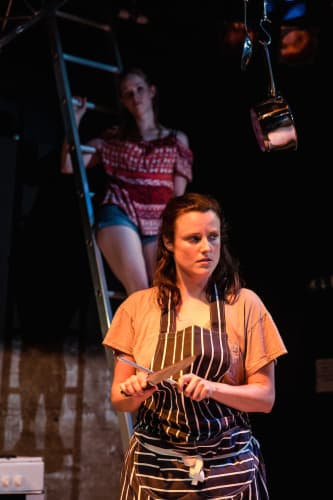Food, which premièred in 2012 and here gets its first production outside Australia, is a tale of two sisters in Tasmania.
Seventeen years ago, attractive, fifteen-year-old Nancy took off on her travels leaving behind more homely Elma to look after their mother and their roadside chippy. Now Nancy is back. She’s in the shower singing while Elma is already hard at it mixing flour and kneading dough. There is both joy and a still-simmering resentment in this reunion.
Food is a play about sisters as family, not political sisterhood, about human needs: food and sex mainly. It presents two different but very real women but it doesn’t set out to be naturalistic as it looks back into memory or explores their reactions to the spirited young Turkish immigrant who they have taken on as an extra help in the kitchen.
Emma Playfair (Elma) and Lily Newbury-Freeman (Nancy) are excellent at achieving that mixture of family bonding and sibling rivalry. Both trained at NISA in Sydney so I guess they are native Australians and their Tasmania accents authentic (they are certainly very different from the Melbourne of Neighbours). With a great deal of shouting and the speed of delivery, they sometimes become incomprehensible to this English ear but not the feeling behind them. That might have been a problem but, despite the reality of its situation, this is a play and a production that go beyond being naturalistic. It conveys its feeling even without full comprehension.
It is played on a traverse stage, floor and end walls covered with what looks like colour-splashed pink plaster (or food debris) while shoved under the low rostrum on which it is played are plastic bottles, crisp packets and fast food detritus. There are two metal ladders criss-crossing each other. The only furniture designer Hannah Wolfe provides are a freezer, a cooker and a deep-fat fryer, all on wheels so that they can be pushed around, not so much to create different locations as to clear floor space for action.
Before the lights go down, director Cressida Brown already has Elma preparing food, building physical awareness through the fascination of watching cooking on stage. This is not carried through the performance but, with input from movement director Ita O’Brien, there are times when the physical takes over, sometimes a whirring of limbs, sometimes gentle movement. There is a beautiful sequence in which Nancy muses at the top of a ladder, looking down to where Elma and Hakan wordlessly make love on the floor at its foot.
The play is shaped so that it seems perfecty natural for actors to turn and talk to the audience; Hakan even hands around some of their artisan bread for a tasting. As the actors move ladders or kitchen equipment, you don’t have to give it specific meaning, it is all part of the flow of performance as it explores different approaches to presentation. Just as some plot is developing, Hakan leaves, we seem back almost at the beginning, but the sisters have learned to understand each other better.
Despite moments when I needed surtitles, including lines that got a few laughs—perhaps from Aussies or specifically Tasmanians—this production’s acting and its theatrical variety kept attention for all of its ninety-minute single act.



